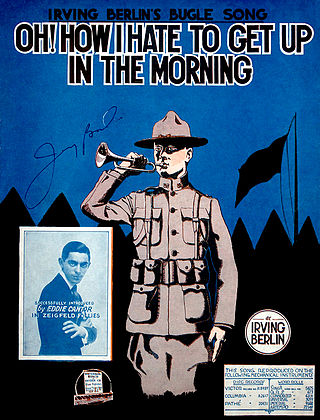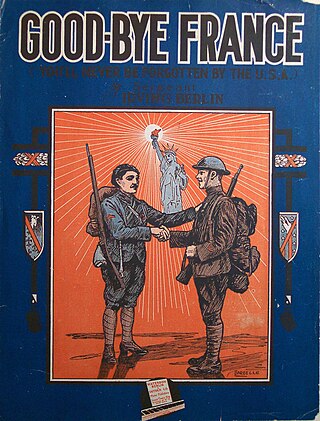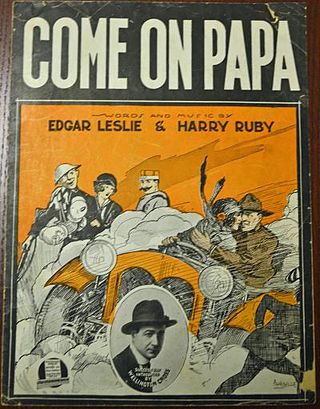
Irving Berlin was an American composer and songwriter. His music forms a large part of the Great American Songbook. Berlin received numerous honors including an Academy Award, a Grammy Award, and a Tony Award. He also received the Presidential Medal of Freedom from President Gerald R. Ford in 1977. Broadcast journalist Walter Cronkite stated he "helped write the story of this country, capturing the best of who we are and the dreams that shape our lives".

Van and Schenck were popular American entertainers in the 1910s and 1920s: Gus Van, baritone, and Joe Schenck (pronounced "skenk"; born Joseph Thuma Schenck,, tenor. They were vaudeville stars and made appearances in the Ziegfeld Follies of 1918, 1919, 1920 and 1921. They made numerous phonograph records for the Emerson, Victor, and Columbia record companies.

"When I Lost You" is a song with music and lyrics by Irving Berlin. It was written in 1912 after his wife of five months, the former Dorothy Goetz, died of typhoid fever. In it he poured out the grief of his loss; it was the only song that he ever admitted had such a connection to his own life. The song, a ballad, was unlike any of Berlin's previous songs, which were upbeat tunes written to take advantage of the dance craze. The song is in a slow waltz tempo. It became Berlin's first hit ballad.

"That Mysterious Rag" is a song by Irving Berlin and Ted Snyder written in 1911. It was one of the earliest Berlin songs to become a commercial success with recordings by Arthur Collins & Albert Campbell and by the American Quartet being very popular in 1912.

"Oh! How I Hate to Get Up in the Morning" is a song written by Irving Berlin in 1918 that gives a comic perspective on military life. Berlin composed the song as an expression of protest against the indignities of Army routine shortly after being drafted into the United States Army in 1918. The song soon made the rounds of camp and became popular with other soldiers, partly because hatred of reveille was universal.

"How Ya Gonna Keep 'em Down on the Farm " is a World War I-era popular song that rose to popularity after the war had ended. The lyrics highlight concern that soldiers would not want to return to their family farms after experiencing the European city life and high culture of Paris during World War I. The song features music by Walter Donaldson and words by Joe Young and Sam M. Lewis. It was published in 1919 by Waterson, Berlin & Snyder Co in New York.

Just a Baby's Prayer at Twilight (For Her Daddy Over There) is a 1918 song composed by M.K. Jerome, with lyrics written by Sam M. Lewis and Joe Young. The song was published by Waterson, Berlin & Snyder Co. The song was performed by Henry Burr and reached number one on the top 100 US songs of 1918. Burr's recording sold a million copies in sheet music and sales.

"Joan of Arc, They Are Calling You" is a 1917 song composed by Jack Wells, and with lyrics written by Al Bryan and Willie Weston. It appeared in the contemporary musical production, This Way Out.

I'm Gonna Pin My Medal on the Girl I Left Behind is a World War I era song about a soldier named Johnny dreaming of coming home and giving his medal to his sweetheart. The song was first featured in Ziegfeld Follies of 1918. It reached the top 20 in August 1918 and climbed even higher to number 14 in September 1918. It was written and composed by Irving Berlin, produced by Waterson, Berlin & Snyder Co., and recorded by the Peerless Quartet. The song is listed as part of the US Library of Congress Recorded Sound Research Center (16,626), the National Jukebox (16,441) and the Recorded Sound Section, Library of Congress (6,098)

Goodbye, France or "Good-bye France " is a World War I era song written and composed by Irving Berlin and published by Waterson, Berlin & Snyder, Inc., in New York City. The sheet music cover, illustrated by Albert Wilfred Barbelle, features French and American soldiers shaking hands with the Statue of Liberty in the background.

"The Man Who Put the Germ in Germany" is a song written in 1918 during World War I. Lyrics and music were composed by Nora Bayes, Sam Downing, and Abe Glatt. Waterson, Berlin & Snyder, Inc. of New York City published the song for both voice and piano. It reached number seven on the US song charts in August 1918.

"The Worst Is Yet to Come" is a World War I-era song recorded on December 12, 1918 in Camden, New Jersey. Sam M. Lewis and Joe Young provided the lyrics. Bert Grant was the composer. The song was published by Waterson, Berlin & Snyder, Inc. in New York City. Billy Murray performed the song. Artist Albert Wilfred Barbelle designed the cover art for the sheet music. On one version of the cover, a soldier is in position to bayonet a prisoner in bed.

"And He'd Say, 'Oo-La-La! Wee-Wee!'" is a World War I era song released in 1919. Lyrics and music were written by George Jessel and Harry Ruby. William Baker arranged the song. It was published by Waterson, Berlin & Snyder, Inc. of New York, New York. The song was written for voice and piano.

"Girls of France" is a World War I era song released in 1917. Al Bryan and Edgar Leslie wrote the lyrics. Harry Ruby composed the music. The song was published by Waterson, Berlin & Snyder Co. of New York, New York. Artist Albert Wilfred Barbelle designed the sheet music cover. It features a nurse in the foreground, and soldiers marching behind her. It was written for both voice and piano.

"The Ragtime Soldier Man" is a World War I era song released in 1912 and 1917. Irving Berlin wrote the lyrics and composed the music, basing it off his 1911 song "Alexander's Ragtime Band". The song was published by Waterson, Berlin & Snyder, Co. of New York, New York. Artist Pfeiffer designed the sheet music cover. It features a U.S. soldier holding his rifle and jumping over cannon balls. The song was written for voice and piano.

"For Your Country and My Country" is a World War I era song released in 1917. Lyrics and music were written by Irving Berlin. The song was published by Waterson, Berlin & Snyder, Co. of New York, New York. Artist Albert Wilfred Barbelle designed the sheet music cover. It features Uncle Sam playing a snare drum with an eagle on his shoulder. In the background are ships sailing, and below are troops marching. Above the title, it reads, "The Official Recruiting Song." The song was written for voice and piano, along with chords for guitar, ukulele, and banjo.

"Come On Papa" is a World War I era song released in 1918.

Let's All Be Americans Now is a World War I song written and composed by Irving Berlin, Edgar Leslie, and George W. Meyer. The song was first published in 1917 by Waterson, Berlin & Snyder Co., in New York, NY, appearing in the Broadway musical, 'Dance and Grow Thin'. The sheet music cover depicts a soldier with his rifle and silhouetted marching soldiers in the background. A popular recording in 1917 was made by the American Quartet.
"When the Sun Goes Down in Romany: My Heart Goes Roaming Back to You" is a World War I song written by Sam M. Lewis and Joe Young and composed by Bert Grant. This song was first published in 1916 by Waterson, Berlin & Snyder, Co. in New York City.
Clifford Hess, better known as Cliff Hess was an American songwriter, composer, lyricist, and pianist. He began his career as pianist while a young teenager working on passenger riverboats on the Mississippi River. He met Irving Berlin while working in the Chicago branch of the music publisher Waterson, Berlin & Snyder, Inc.. By 1911 he was working as Berlin's secretary, and appeared on Broadway that year with Berlin as his accompanist in performances of his songs. He served as Berlin's secretary until 1918 and was largely responsible for not only notating Berlin's songs into sheet music, but also editing his works into playable keys and simplifying works to make them accessible for commercial sale. After leaving Berlin, he became a successful songwriter in his own right with many tunes being recorded for Victor Records and Columbia Records. He also wrote songs for films during the 1930s and some of his tunes were interpolated into musicals.


















